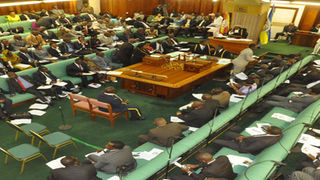
Parliament in session. PHOTO/FILE
|People & Power
Prime
House boycott a stark reminder of challenges ahead for Opposition
What you need to know:
- Analysts say the walk out of Parliament and attempted censure of Security minister Jim Muhwezi over torture of suspects under detention were only symbolic gestures, adding that Opposition needs to find a new way of countering the majority NRM MPs.
When Leader of Opposition in Parliament (LoP) Mathias Mpuuga announced another boycott and marshalled his MPs out of the House a fortnight ago, many wrote it off as another lost battle.
Such proponents were quick to cite the boycott in late September last year that ended in less than a fortnight devoid of the desired results.
Both boycotts were purposed to press government to, among others, rein in the security forces to stop acts of human rights violation and also end the continued detention of National Unity Platform (NUP) MPs Muhammad Ssegirinya (Kawempe North) and Allan Ssewanyana (Makindye West).
Uncoordinated movement
Just days into the boycott, the Opposition partially suspended the boycott to allow MPs pay tribute to the late Emorimor (Teso cultural leader) Augustine Osuban.
“I think what we did is simple to see even for a kid. It was a special sitting that had one issue and it was never partisan. That we did after consulting all party whips and all of us found it humanly befitting,” Mpuuga says.
Prior to this, lawmakers from Acholi sub-region but within Mpuuga’s camp claimed to have been sidelined by the LoP when he allegedly declined to support matters pressing their constituents.
The matters alluded to include the unresolved land conflict between the Acholi and Madi communities and the rampant cattle rustling in the sub-region.
Acholi Parliamentary Group chairperson Anthony Akol accused Mr Mpuuga of taking a ‘backseat’ in matters affecting their region.
This later saw the LoP convene a three-day retreat in Entebbe to try and improve cohesion between his MPs.
The retreat also purposed to flush out internal fights and bickering among Opposition MPs, however, less than a week later Shadow Local Government minister Martin Ojara Mapenduzi championed the drive to censure Francis Zaake off his seat as a commissioner of Parliament.
Mr Zaake is accused of using social media to attack Deputy Speaker Anita Among. The matter has been sent to the parliamentary Rules, Privileges and Discipline Committee.
On Tuesday in his address to mark the end of the boycott, he was asked by journalists about how he was going to fix the cracks within the Opposition.
“It compromises our unity but certainly it will not break our cohesion as the Opposition,” Mr Mpuuga responded.
Considering that the events unfolded while he was out of the country, Mr Mpuuga has promised to engage legislators Akol and Mapenduzi before a position can be drawn.

Leader of Opposition in Parliament, Mr Mathias Mpuuga. PHOTO | PARLIAMENT
As one symbol of his focus, Mr Mpuuga insists that he will push for justice for persons that have suffered human rights violation at the hands of the State.
Loss in waiting
Some opine that the Opposition was fully cognisant of the loss in waiting, but were simply throwing a powerless jab at an immovable State muscle.
READ: A State of torture?
Mr Moses Khisa, a commentator on politics currently teaching in the United States, believes that the boycott was bound to fail.
“There’s nothing much Parliament can do that will make the Executive accountable where [President] Museveni is directly involved, where he feels his power is threatened or on matters that touch on his opponents,” he says. “Human rights violations are being committed against Museveni’s opponents and critics, in the service of his rule, and Mr Museveni has no problem with this.”
He added: “So, beyond boycotting parliamentary sittings, MPs must take the fight to the people. They have to mobilise the public and draw attention to all Ugandans on the excesses and abuses of the rulers.”
The need to have the majority masses involved in the push for action against continued acts of human rights violation is something political analyst Siraji Nsanja also says that Opposition should have done.
However, folks in Opposition believe that those that frowned at the failed attempt to censure Security minister Jim Muhwezi were blind to the string of human rights violations, and in so doing, MPs that shunned the exercise absconded from their the duty to press the State against acts of torture.
However, Khisa says that was bound to be an uphill task since the House is largely comprised of the ruling National Resistance Movement (NRM) party MPs.
“At best, boycotting Parliament can only have symbolic value. Opposition MPs are right to take action and be seen to have done something. But in substantive terms, what they are doing is inconsequential,” Mr Khisa said. “The NRM ‘majority mob’ can do whatever they want, especially now that they are led by a Speaker and Deputy Speaker who were practically picked by Mr Museveni.”
Numbers
The censure motion against Security minister Jim Muhwezi collapsed this week with only 88 MPs out of the required 176 signing the motion.
This is not the first time that the Opposition is moving to censure ministers. In the past, different Opposition leaders sought to censure ministers but the process collapsed after failing to raise the required signatures due to their decimal number in Parliament.




